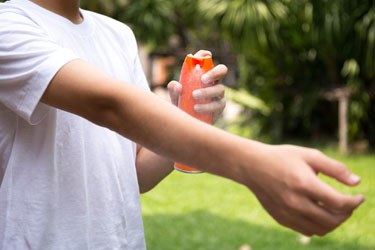Veterinarian Tips: DEET Dangerous to Pets

The two biggest pests of the summer don’t stand a chance when it comes to N,N-diethyl-meta-toluamide! Commonly referred to as DEET, this chemical is used by an estimated one-third of the United States population to repel mosquitos and ticks.
Safe for Human Use
Available for use through a variety of products, DEET was developed by the Army in 1946 and works to repel mosquitos and ticks by making it difficult for them to detect humans through smell.
Not Safe for Animal Use
DEET is available in the easy use forms of liquids, lotions, roll-ons, sprays, and towelettes, but DEET products are not safe for animal use. Every year, the American Society for the Prevention of Cruelty to Animals (ASPCA) poison control center reports on situations that either involve owners who have applied DEET products on their pets or are about animals that have gotten into containers of DEET products that were accidentally left out.
To ensure the health of your patients, make sure your clients know the dangers of DEET for their animals.
Signs of and Treatment for DEET Exposure
The chemical insecticide that DEET is comprised of is found in over 500 different products, all of varying concentrations. When considering the risk to the animal, the higher the concentration, the greater the health risk.
Sprayed Into the Eyes
If an animal has DEET sprayed into its eyes, the insecticide may result in ocular damage arising from:
- Conjunctivitis
- Scleritis
- Blepharospasm
- Epiphora
- Lethargy and depression
- Uveitis
- Corneal ulceration.
Treatment: When DEET gets into the eyes, the eyes will need to be flushed for at least 15 minutes with a sterile saline product.
Inhalation
Animals that have breathed in DEET insecticide may experience:
- Airway inflammation
- Dyspnea.
Treatment: The treatment of animals that have inhaled DEET may require the use of:
- Steroids
- Bronchodilators
- Oxygen.
Ingestion
If an animal consumed DEET, it‘s common for them to experience gastrointestinal distress. If the product has a high concentration of DEET, 80% or more, the animal may experience additional types of problems, including:
- Ataxia
- Disorientation
- Tremors
- Seizures.
Treatment: The therapy for ingestion of DEET products could consist of:
- Gastrointestinal protectants. If the animal consumed a large quantity of DEET, give activated charcoal that has been diluted with milk.
- Antiemetic. Whenever DEET is ingested, the animal is at risk of aspiration and emesis should never be induced.
- Benzodiazepines. When a large amount of DEET is swallowed, the animal may benefit from being given benzodiazepines to control tremors or seizures.
Dermal Exposure
An animal whose skin has been exposed to DEET may show irritation. High levels may cause tremors or seizures.
Treatment: An animal whose skin has been exposed to DEET will require a bath using a liquid dishwashing detergent. Should the skin show signs of a significant irritation, the animal should be provided with antihistamines. If the animal is observed to be experiencing tremors or seizures, benzodiazepines should be administered.
When it comes to repelling the insects that cause human and animal illnesses, such as West Nile Virus and Lyme disease, DEET products work. However, even though both people and pets would benefit from its use, the product was only created for humans. Unfortunately, because it works so well and is used by so many people, it often ends up being applied to pets, which could have damaging effects on the animal’s health.
https://www.epa.gov/insect-repellents/deet
http://www.aspcapro.org/resource/shelter-health-poison-control/dont-deet-dog
Careers
Are you looking for a place to let your talents shine? At Covetrus, we help our practitioner customers better serve their patients and take pride in providing the best customer experience possible. Search our open positions to see our available opportunities.
Newsletter
Stay current with what’s going on with Covetrus, subscribe to receive our newsletter and email communications. Subscribers will receive the latest information in practice management, sales and marketing, animal health, and more.


Leave a comment